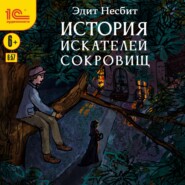По всем вопросам обращайтесь на: info@litportal.ru
(©) 2003-2024.
✖
The Literary Sense
Настройки чтения
Размер шрифта
Высота строк
Поля
"I won't be angry," she said. "Besides the owl, it's disrespectful to the dear, sleepy, dead people to be angry in a churchyard. But if I were really superstitious, you know, I should be afraid to come here at night."
"At the end of the day," I corrected. "It is not night yet. Tell me before the night comes all the wonderful things you believe. Recite your credo."
"Don't be flippant. I don't suppose I believe more unlikely things than you do. You believe in algebra and Euclid and log – what's-his-names. Now I don't believe a word of all that."
"We have it on the best authority that by getting up early you can believe six impossible things before breakfast."
"But they're not impossible. Don't you see that's just it? The things I like to believe are the very things that might be true. And they're relics of a prettier time than ours, a time when people believed in ghosts and fairies and witches and the devil – oh, yes! and in God and His angels, too. Now the times are bound in yellow brick, and we believe in nothing but … Euclid and – and company prospectuses and patent medicines."
When she is a little angry she is very charming, but it was too dark for me to see her face.
"Then," I asked, "it is merely the literary sense that leads you to make the Holy Sign when you find two knives crossed on your table, or to knock under the table and cry 'Unberufen' when you have provoked the Powers with some kind word of the destiny they have sent you?"
"I don't," she said. "I don't talk foreign languages."
"You say, 'unbecalled for,' I know, but this is mere subterfuge. Is it the literary sense that leads you to treasure farthings, to refuse to give pins, to object to a dinner party of thirteen, to fear the plucking of the golden elder, to avoid coming back to the house when once you've started, even if you've forgotten your prayer-book or your umbrella, to decline to pass under a ladder – "
"I always go under a ladder," she interrupted, ignoring the other counts; "it only means you won't be married for seven years."
"I never go under ladders. Tell me, is it the literary sense?"
"Bother the literary sense," she said. "Bother" is not a pretty word, but this did not strike me till I came to write it down. "Look," she went on, "at the faint primrose tint over the pine trees and those last pink clouds high up in the sky."
I could see the outline of her lifted chin and her throat against the yew shadows, but I determined to be wise. I looked at the pine trees and said —
"I want you to instruct me. Why is it unlucky to break a looking-glass? and what is the counter-charm?"
"I don't know" – there was some awe in her voice – "I don't think there is any counter-charm. If I broke a looking-glass I believe I should have to give up believing in these things altogether. It would make me too unhappy."
I was discreet enough to pass by the admission.
"And why is it unlucky to wear black at a wedding? And if anyone did wear black at your wedding, what would you do?"
"You are very tiresome this evening," she said. "Why don't you keep to the point? Nobody was talking of weddings, and if you must wander, why not stray in more amusing paths? Why don't you talk of something interesting? Why do you try to be disagreeable? If you think I'm silly to believe all these nice picturesque things, why don't you give me your solid, dull, dry, scientific reasons for not believing them?"
"Your wish is my law," I responded with alacrity. "Superstition, then, is the result of the imperfect recognition in unscientific ages of the relations of cause and effect. To persons unaccustomed correctly to assign causes, one cause is as likely as another to produce a given effect. Hallucinations of the senses have also, doubtless – "
"And now you're only dull," she said.
The light had slowly faded while we spoke till the churchyard was almost dark, the grass was heavy with dew, and sadness had crept like a shadow over the quiet world.
"I am sorry. Everything I say is wrong to-night. I was born under an unlucky star. Forgive me."
"It was I who was cross," she admitted at once very cheerfully, but, indeed, not without some truth. "But it doesn't do anyone any harm to play at believing things; honestly, I'm not sure whether I believe them or not, but they have some colour about them in an age grown grey in its hateful laboratories and workshops. I do want to try to tell you if you really want to know about it. I can't think why, but if I meet a flock of sheep I know it is lucky, and I'm cheered; and if a hare crosses the path I feel it is unlucky, and I'm sad; and if I see the new moon through glass I'm positively wretched. But all the same, I'm not superstitious. I'm not afraid of ghosts or dead people, or things like that" – I'm not sure that she did not add, "So there!"
"Would you dare to go to the church door at twelve at night and knock three times?" I asked, with some severity.
"Yes," she said stoutly, though I know she quailed, "I would. Now you'll admit that I'm not superstitious."
"Yes," I said, and here I offer no excuse. The devil entered into me, and though I see now what a brute beast I was, I cannot be sorry. "I own that you are not superstitious. How dark it is growing. The ivy has broken the stone away just behind your head: there is quite a large hole in the side of the tomb. No, don't move, there's nothing there. If you were superstitious you might fancy, on a still, dark, sweet evening like this, that the dead man might wake and want to come up out of his coffin. He might crouch under the stone, and then, trying to come out, he might very slowly reach out his dead fingers and touch your neck. Ah!"
The awakened wind had moved an ivy spray to the suggested touch. She sprang up with a cry, and the next moment she was clinging wildly to me, as I held her in my arms.
"Don't cry, my dear, oh, don't! Forgive me, it was the ivy."
She caught her breath.
"How could you! how could you!"
And still I held her fast, with – as she grew calmer – a question in the clasp of my arms, and, presently, on my lips.
"Oh, my dear, forgive me! And is it true – do you? – do you?"
"Yes – no – I don't know… No, no, not through my veil, it is so unlucky!"
THE LOVE OF ROMANCE
SHE opened the window, at which no light shone. All the other windows were darkly shuttered. The night was still: only a faint breath moved among the restless aspen leaves. The ivy round the window whispered hoarsely as the casement, swung back too swiftly, rested against it. She had a large linen sheet in her hands. Without hurry and without delayings she knotted one corner of it to the iron staple of the window. She tied the knot firmly, and further secured it with string. She let the white bulk of the sheet fall between the ivy and the night, then she climbed on to the window-ledge, and crouched there on her knees. There was a heart-sick pause before she grasped the long twist of the sheet as it hung – let her knees slip from the supporting stone and swung suddenly, by her hands. Her elbows and wrists were grazed against the rough edge of the window-ledge – the sheet twisted at her weight, and jarred her shoulder heavily against the house wall. Her arms seemed to be tearing themselves from their sockets. But she clenched her teeth, felt with her feet for the twisted ivy stems on the side of the house, found foothold, and the moment of almost unbearable agony was over. She went down, helped by feet and hands, and by ivy and sheet, almost exactly as she had planned to do. She had not known it would hurt so much – that was all. Her feet felt the soft mould of the border: a stout geranium snapped under her tread. She crept round the house, in the house's shadow – found the gardener's ladder – and so on to the high brick wall. From this she dropped, deftly enough, into the suburban lane: dropped, too, into the arms of a man who was waiting there. She hid her face in his neck, trembling, and said, "Oh, Harry – I wish I hadn't!" Then she began to cry helplessly. The man, receiving her embrace with what seemed in the circumstances a singularly moderated enthusiasm, led her with one arm still lightly about her shoulders down the lane: at the corner he stood still, and said in a low voice —
"Hush – stop crying at once! I've something to say to you."
She tore herself from his arm, and gasped.
"It's not Harry," she said. "Oh, how dare you!" She had been brave till she had dropped into his arms. Then the need for bravery had seemed over. Now her tears were dried swiftly and suddenly by the blaze of anger and courage in her eyes.
"Don't be unreasonable," he said, and even at that moment of disappointment and rage his voice pleased her. "I had to get you away somehow. I couldn't risk an explanation right under your aunt's windows. Harry's sprained his knee – cricket. He couldn't come."
A sharp resentment stirred in her against the lover who could play cricket on the very day of an elopement.
"He told you to come? Oh, how could he betray me!"
"My dear girl, what was he to do? He couldn't leave you to wait out here alone – perhaps for hours."
"I shouldn't have waited long," she said sharply; "you came to tell me: now you've told me – you'd better go."
"Look here," he said with gentle calm, "I do wish you'd try not to be quite so silly. I'm Harry's doctor – and a middle-aged man. Let me help you. There must be some better way out of your troubles than a midnight flight and a despairingly defiant note on the pin-cushion."
"I didn't," she said. "I put it on the mantelpiece. Please go. I decline to discuss anything with you."
"Ah, don't!" he said; "I knew you must be a very romantic person, or you wouldn't be here; and I knew you must be rather sill – well, rather young, or you wouldn't have fallen in love with Harry. But I did not think, after the brave and practical manner in which you kept your appointment, I did not think that you'd try to behave like the heroine of a family novelette. Come, sit down on this heap of stones – there's nobody about. There's a light in your house now. You can't go back yet. Here, let me put my Inverness round you. Keep it up round your chin, and then if anyone sees you they won't know who you are. I can't leave you alone here. You know what a lot of robberies there have been in the neighbourhood lately; there may be rough characters about. Come now, let's think what's to be done. You know you can't get back unless I help you."
"I don't want you to help me; and I won't go back," she said.
But she sat down and pulled the cloak up round her face.
"Now," he said, "as I understand the case – it's this. You live rather a dull life with two tyrannical aunts – and the passion for romance…"
"They're not tyrannical – only one's always ill and the other's always nursing her. She makes her get up and read to her in the night. That's her light you saw – "

















